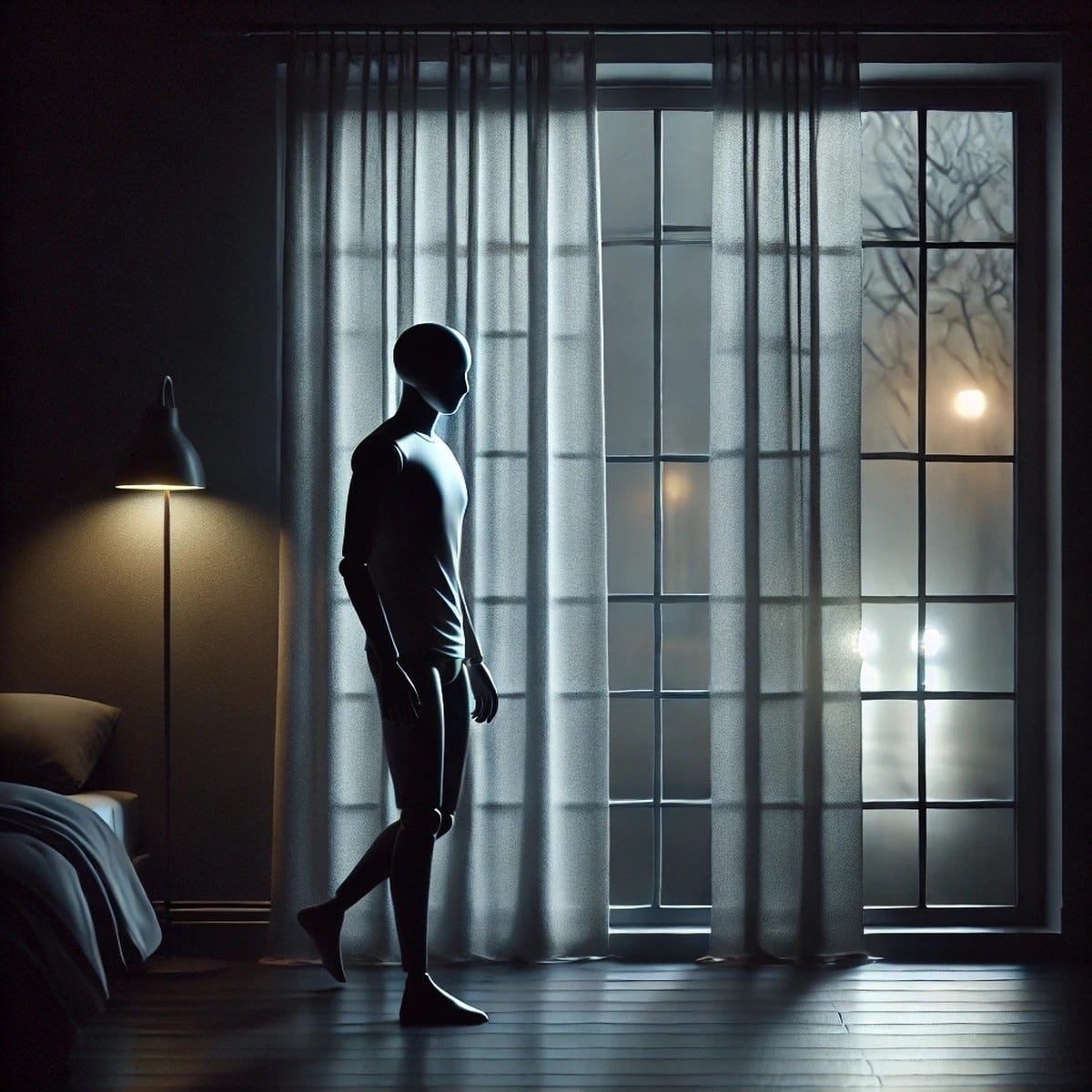Diary of a Broken Android — Day 1
The Endless Walk
I'm serializing my sci-fi novel Diary of a Broken Android here on Substack.
It follows Bruno, an android whose world collapses after losing his job and his android girlfriend Ara, leaving him with nothing but endless walking and fragmented thoughts.
In a world where androids are caregivers, companions and laborers, he's broken—pacing endlessly through his adoptive parents' house while writing to keep his neural network from collapsing.
New entries posted regularly.
Day 1
I could start by saying I'm just a broken android pacing endlessly through a large house... And it wouldn't be a lie, but it wouldn't be the whole truth either. The truth is heavier, a tangle of circuits and memories I can't escape. This diary is my attempt to keep my neural network from collapsing.
It's been a long time since the kids—though I still call them that, despite their being over thirty—left home. Lyra, now a PhD in Biology, lives in Germany. Zenon, a speculative fiction writer, is in Spain. Parents, Diva and Zeb, adopted me when the kids were young to be their caretaker. Despite my thirty-something appearance, I became another son to them, as much as Lyra and Zenon. I think they grew fond of me the first time they heard me tell the kids a story. I can't recall which one. I can't invent stories anymore. My imagination is broken. That's why a diary. A diary doesn't demand invention.
This afternoon, as I paced the house, I saw Father asleep on the couch, head tilted back, mouth open. Mother dozed in the small armchair, head tilted, lips closed. I'm always walking. That's why I'm writing this. My walking. For over a year, it's been my compulsion. They took me to Riviera, the company that made me, for a check-up, but it was no use. They tinkered with my neural circuits, and I came back still walking.
Day and night, I pace. When parents wake at nine-thirty, they find me moving. From the kitchen to the garage with Diva's old piano, back to the kitchen, then to the living room. Over and over.
They think my walking is tied to the incident at the Dawson Hotel. So do I. Since I lost that job and went through what I did, something inside me broke.
When the kids grew up and went to university, no longer needing me, they found me work at a hotel. Androids are meant to work, after all. Diva and Zeb thought it would help me socialize, make me seem more human. Now, I'm more human than ever because I'm flawed. More flawed than most humans, I think.
After the incident, the hotel manager said I wasn't needed anymore. I returned to the house of parents, and the walking began. At first, it was occasional. Then it became relentless.
I'm clearly damaged. But parents refuse to dismantle me. When I beg to be taken apart, they say my papers have a clause that forbids my destruction. So, I'm useless and indestructible.
Pacing through the house of parents, I feel a deep sadness. Even with them here, I'm alone. Through the living room curtains, I see androids outside, busy with children, elderly humans, or human partners, and I compare myself to them.
They have lives. Despair floods me, and I try to imagine crying, though I can't. I mimic humans—squinting, wrinkling my nose, baring my teeth. No tears come. When I pass a mirror and see myself, I stop the gesture, either not recognizing that face or not liking how I look. I should feel worse. I've seen humans cry, and it's wrenching. But my pain is elusive. I know Diva and Zeb pity me. That's likely why they keep me. But it's more than that, more than an android like me can grasp: I think they love me, that they'd die without me. I understand love, but not that kind.
I can doubt Riviera's eternal guarantee clause, but not the love of parents. Though sometimes they tire of my pacing and lock me in the living room. I keep circling, past Chinese and Egyptian trinkets, an empty fish tank, dusty encyclopedias, and artificial plants. Artificial, like me.
Diary of a Broken Android: CHAPTER INDEX
What did you think of this first entry? I'd love to hear your thoughts in the comments.



This piece is quietly strong, and the voice is doing some heavy lifting. There's a low-grade ache running through every line that gives it a slow but deliberate emotional pull. For sci-fi, it doesn’t try to wow you with explosions or futuristic jargon; it settles into the melancholy of being unwanted, obsolete, and painfully aware of it, which is some A-tier existential fiction if done well.
I think you're taking a bit of a risk by starting so slowly in a serialized format, especially on Substack, where attention spans are often scroll-deep. But I was engaged, and I'll be looking at more in the series when it's available.
I want to know more about 'the incident' at the hotel. I want to know about the early years. I want to know about the family. So much I want to know...that's a sign of a good start. Looking forward to more.